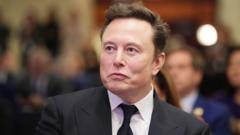In a bold display of financial influence ahead of Wisconsin’s crucial Supreme Court election, billionaire Elon Musk has distributed $1 million cheques to voters, drawing both support and legal challenges. The controversial giveaway comes just days before the pivotal election, where control of the state’s Supreme Court could pivot to the Republicans.
The situation sparked legal tension, as Wisconsin Attorney General Josh Kaul, a Democrat, attempted to halt Musk's financial campaign, arguing that it likely infringes on state laws prohibiting gifts in exchange for votes. This election has escalated in significance, emerging as the most expensive judicial election in American history, underscoring its potential impacts on not only local governance but broader national policies in the months leading up to the 2024 elections.
Speaking passionately at a rally, Musk claimed, “We just want judges to be judges,” while handing out two cheques to voters advocating against “activist” judges. Musk's legal team countered Kaul's claims by asserting that the giveaway serves to galvanize grassroots opposition to perceived judicial activism rather than directly supporting any candidate.
Following rulings from two lower courts in Musk's favor, Kaul sought intervention from the state's Supreme Court just hours before the election. However, the high court unanimously declined to hear the case, allowing the cheques’ distribution to proceed.
This election features Judge Brad Schimel, a conservative candidate endorsed by both Musk and former President Donald Trump, competing against liberal-leaning Judge Susan Crawford, who has the backing of the state Supreme Court's liberal justices. Analysts have positioned this race not just as a local contest, but as a referendum on Trump's influence and the trajectory of crucial issues such as abortion rights and redistricting.
Interestingly, despite Musk’s significant financial backing, Judge Schimel distanced himself from Musk’s rally, admitting he had no knowledge of Musk's plans and expressing hesitance regarding the association.
Musk's engagement in Wisconsin politics is not new; he previously offered a $1 million cash prize for voter participation aimed at protecting First and Second Amendment rights, which was ultimately deemed legally permissible by a Pennsylvania judge.
As the state looks to finalize its judicial decisions, the implications of Musk's wealth and influence in politics continue to resonate, raising questions about the future of democratic processes in the United States.
















